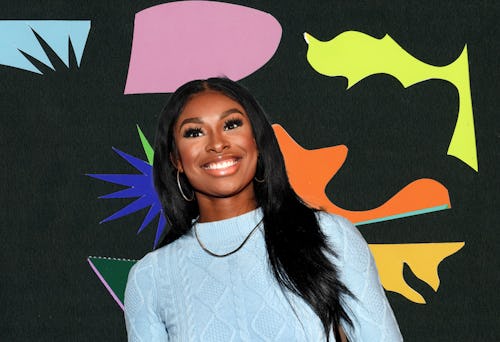A love letter to Coco Jones and all the dark-skinned women I love to watch
We deserve to be seen.

Peacock’s latest drama Bel-Air just wrapped its first season and its breakout star, Coco Jones, has reminded me of the importance of dark skinned characters getting to shine on-screen. Jones rose to fame from her time as a Disney child actress on Let It Shine. Since then, she’s been working on her music but finally returned to TV, giving the iconic Hilary Banks new life. Aside from her artistry, Jones plays an important role for many of us, entering a legacy of Black TV actors who hold a special place in the hearts and minds of dark skinned women, femmes, and girls who get to see themselves fully realized.
My reverence for dark-skinned characters began with the only Cinderella that matters: Brandy, in the 1997 rendition. Seeing her in sparkly blue eyeshadow and fresh microbraids gave young me not just a role model, but a reflection of the beauty the dark skinned women in my family had always conjured while living in a world hell-bent on dismissing and discarding them.
The Christmas my mother got me a Brandy Barbie was one of my most memorable. I kept that doll until it had no hair left and was on its last leg. The plastic toy solidified my suspicion that Black girls like me could be beautiful. It took me years to verbalize what the women in my family and I had endured for centuries: an anti-Black world that sees dark skin as undesirable under the tenets of colorism and texturism.
Whether it was seeing Lauryn Hill steal the screen in Sister Act 2 or secretly wishing Pam from Martin was the star, I have always yearned for a world where darker skinned Black women are given a full range of beauty, expression, and humanity. Thankfully many actors are fighting to see that possibility last longer than just a news cycle, actress Jodie Turner-Smith’s advocacy around colorism and anti-blackness remains a hurdle Hollywood has yet to fully tackle.
The concept of colorism is a feature of anti-blackness that affects and hinders the wellbeing of dark skinned people every day. It sits within a system of prejudice that knows no borders. Anti-Blackness is a global project that looks and moves differently based on how you are perceived by the world.
"In subtle and overt ways, society said to me and so many other dark girls that beauty was our only inherent value as women, but our skin was an obstacle to this beauty that was our currency." said author Zeba Blay on the lived reality of colorism impacts her ideas of beauty.
These systems of prejudice show up in every diasporic community from India and China to South America. Dark skinned women are still deemed less desirable on dating apps and at job interviews. Darker skinned Black women in particular face more prison time and are often assumed to be more aggressive no matter what. Light skinned Black women, on the other hand, face the perils of fetishization and a world that sexualizes them at every turn. It’s same beast with two heads.
Write, Clarissa Brooks at age 4.
I am grateful to have grown up in a world with dark-skinned women who made the impossible visible and who warned me in honest ways about the cruelty Black girls face every day. I actively heal and unpack the effects of this unjust system everyday, all while nurturing my sense of beauty — which often involves savoring the appearances of dark skinned women on screen.
It’s been a process. The racist, colorist jokes and mocking I endured throughout my teenage years feel small in comparison to the way me and women around me have chosen to center our own sanctity. My aunts and older cousins not only taught me how to match my foundation but changed my center of gravity in a way that still feels invaluable.
Representation is a metric of visibility that has always felt fleeting to me. Being seen isn’t my first entry point to how I understand beauty or power. It was seeing dark-skinned Black girls on TV, in films, and in cartoons that were fully realized that pulled me in. I gravitated to the characters that were supposed to be sidekicks that demanded a scene, they remain for me the true gems. It taught me that, like those figures, I could possess a power that is not defined by how others see me as long as I see myself first. Dark skinned girls across the globe deserve this moment and so much more.